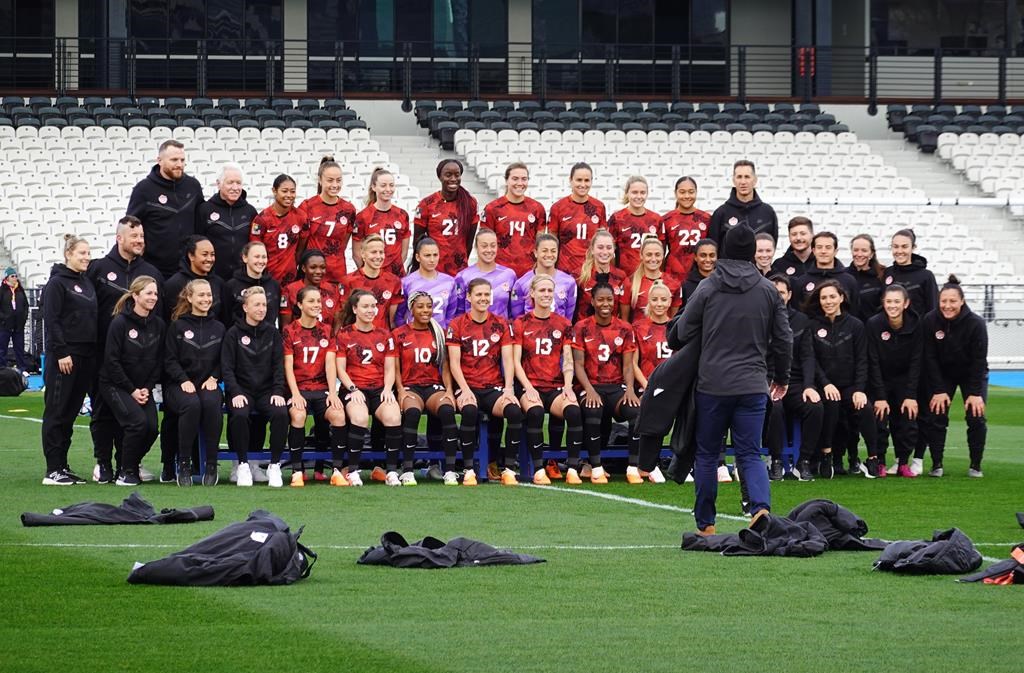The FIFA Women’s World Cup is already setting records. But there have been growing pains getting to Thursday’s kickoff.

The hope is the focus will now remain on football. Canada coach Bev Priestman predicts the expanded tournament will deliver heaps of entertainment and drama, across nine host cities in Australia and New Zealand.
“It’s tighter than it’s ever been. The women’s game is more exciting than it’s every been,” she said. “And for me, to look at a 32-team World Cup across two nations in this part of the world, there’s a whole host of firsts in this World Cup. And it’s going to be super-exciting to be part of.”
The tournament is the largest Women’s World Cup ever – and the first in the Southern Hemisphere. FIFA has already boasted of record attendance with the previous mark of 1,353,506 spectators, set in Canada in 2015, already surpassed with close to 1.4 million tickets sold.
Tickets have been bought in 182 different countries with Canada ranking in the top 10 in terms of sales.
A modest 12 teams contested the first women’s tournament in 1991 in China, eventually increasing to 24 eight years ago in Canada and now 32 with No. 21 Portugal, No. 22 Ireland, No. 32 Vietnam, No. 46 Philippines, No. 52 Panama, No. 53 Haiti, No. 72 Morocco and No. 77 Zambia joining the party for the first time.

History suggested the newcomers are in for a rude welcome.
FIFA says of the 17 teams that have made their Women’s World Cup debuts this century, 11 failed to win a match at their debut tournament. Only three survived the group phase to make the knockout rounds – with Switzerland, the Netherlands and Cameroon moving on in 2015 in Canada.
Getting this far off the field has not been easy. Women have had to battle for everything from equal pay to being able to wear boots not designed solely for men. And the fight is far from over.
Under pressure, FIFA has increased basic prize money for the tournament to US$110 million, up from $30 million in 2019 and $15 million in 2015. That still pales in comparison to the $440 million paid out at last year’s men’s soccer showcase in Qatar.
“Obviously it’s a step in the right direction,” said Canada captain Christine Sinclair. “The women’s game deserves it.
“It’s hard for me to sit here and be like ‘Yeah, way to go FIFA,’ when there’s so much more than can be done. It is a step in the right direction but it seems to be moving far too slowly compared to the growth of the game.”
The Canadian men earned $9 million for Canada Soccer last year in Qatar, where they failed to win a game or advance out of the first round. Compare that to the $4.29 million payday for winning the women’s tournament (Argentina collected US$42 million for hoisting the trophy in Qatar).
FIFA president Gianni Infantino has said the world governing body’s goal is to have equal prize money at the 2026 men’s and 2027 women’s World Cups.

Each participating player at this Women’s World Cup is guaranteed at least $30,000 for participating in the tournament, with the amount rising to $270,000 for players on the winning team. But Infantino told a news conference Wednesday there is no mechanism currently in place to guarantee the money goes directly to the players
While the seventh-ranked Canadian women’s fight for an equitable labour agreement and the support needed to remain at the leading edge of the sport is well-documented, other teams from England and France to Nigeria and Spain have also battled with their federations.
Australia’s Matildas collectively took to social media on the eve of the tournament to decry the lack of gender equity and the fact that some teams, without collective bargaining agreements, are not receiving fair and equitable treatment.
The tournament features an array of established stars like Canada’s Sinclair, Australia’s Sam Kerr, Denmark’s Pernille Harder,England’s Lucy Bronze, Germany’s Lena Oberdorf, Spain’s Alexia Putellas and American Alex Morgan as well as a new generation of talent like Americans Trinity Rodman and Sophia Smith.
Canadians may look back at this tournament years from now as a senior platform for 18-year-old forward Olivia Smith.
But other marquee names are missing.
The women’s game is dealing with an unexplained rash of anterior cruciate ligament injuries, with Canada’s Janine Beckie, England’s Beth Mead and Leah Williamson, Germany’s Giulia Gwinn, the Netherlands’s Vivianne Miedema and Americans Christen Press and Catarina Macario among the marquee names missing out on the tournament after knee surgery.
The injuries have meant powerhouses like the top-ranked U.S. and No. 4 England are missing some key parts.
On the plus side, most agree the growth in the women’s game will make for the most wide-open tournament ever.
The U.S. won four of the previous eight tournaments (1991. 1999, 2105 and 2019), with Germany lifting the trophy twice (2003 and 2007) and Norway (1995) and Japan (2011) each winning once. Canada’s best finish was fourth in 2003 in the U.S.
Times are changing, Priestman believes.
“Absolutely. For many many reasons,” she said. “But what I would say is now I think any top-10 team playing each other, I don’t think there’s a given (result). And historically in the women’s game, that’s been very clear. That leaves it wide open. You’ve got all of the different realms of travel, the injuries that have occurred, the lack of flow. There’s a whole host of things that do make it more open. And 32 teams.
“Look at our group. I don’t think there’s a given game. You could argue on paper there is but actually I don’t think there is a given game. And normally in a World Cup group there is that given game. So yeah, I think it’s wide open and I don’t think it’s really set on who could go all the way.”




Comments